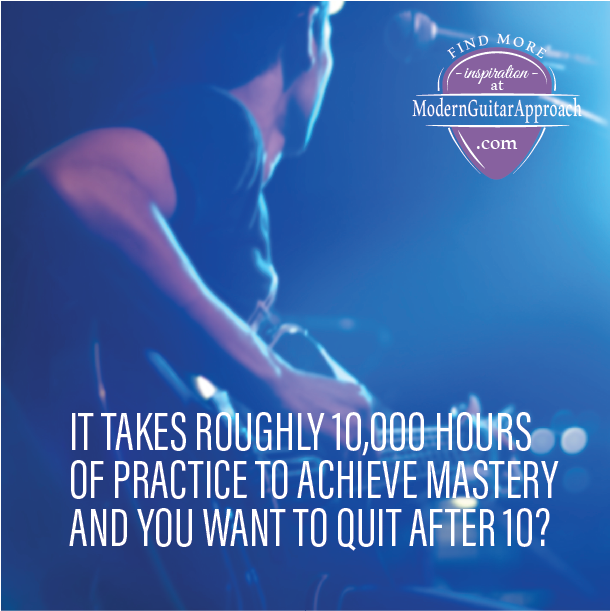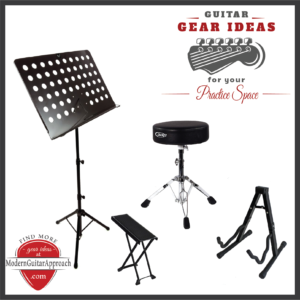Make this year your most musical year yet with these 10 excellent new year’s resolutions to help you become a better guitar player.
1. Increase your Practice Time
Every minute you increase your practicing will add up over time. In the book Outliers, author Malcolm Gladwell says that it takes roughly 10,000 hours of practice to achieve mastery in a field. Learning an instrument will take time, but you can improve dramatically by simply increasing how long you practice. Here are a few ways to increase your practice time over a week.
- Practice Every Day – It’s easy to have a few days go by without picking up your guitar. If you can find a way to practice everyday, you can dramatically improve your playing. Studies have also shown that sleep can also help your playing. This works best if you are practicing every day rather than cramming in the same amount of minutes in a few days.
- Practice More Than Once A Day – Sometimes it’s easier to sit down and practice if you know that it will only be for a few minutes so try spreading out your practice sessions to multiple times in a day. This also helps your subconscious mind work through the music during the time you aren’t practicing.
- Schedule It – For some people, the easiest thing to do is schedule out activities on a calendar. Free yourself from distractions during this time and enjoy the time and opportunity to practice a great instrument :).

3. Create a Practice Space
Having a designated practice space can make a huge difference in how often you pick up your instrument. You don’t need a large space or an entire room to make this work. You can fit the essential items for a practice space into a small corner or nook. If you’re looking for other gear ideas to put in your practice space, check out my last post Gifts For Guitar Players.
Here is a list of the gear I keep in my own practice space.
- A chair without arms – I use a drum chair as a practice chair. The height can be adjusted and you can take it with you to gigs. Any drum throne will work, but here’s one that is a good deal and gets good ratings:
- A footstool – Footstools aren’t just for classical guitarists. They help keep the guitar close to your body which helps you hold your guitar correctly. A footstool that I’ve used in the past and can recommend is Standard’s Guitar Foot Stool 7590.
- A music stand – You need a stand that is sturdy enough to hold your music and keep it there. The stands that fold up tiny are terrible and your music will often end up on the floor. I just recently switched my music stand to one that is lighter and more portable, yet still strong. I love it, it’s the RockJam G905 Height & Angle Adjustable Orchestral Conductor Sheet Stand.
- A guitar stand – It’s a good idea to keep your guitar in it’s case at night with a humidifier (check out goal #10). However, if your guitar is out and accessible during the day, you’ll be more likely to pick it up. I prefer to use stands that are light weight and portable. I have several guitar stands, but my favorite one is the TopStage Folding Guitar Stand.
- A table or stand nearby to hold some guitar picks, a guitar tuner, a pencil and capo.
- A guitar amp & cables (if you play the electric guitar)

1. Memorize a Song
One of the reasons why I do regular guitar recitals for my students is to teach them how to memorize a song. Memorizing music will help you learn the song differently. Once the song is “off the page” and into your brain, you will play it better. It also gives you something to play when you see a guitar at a store or at a friends house. Here are a few tips to help you memorize a song.
- Memorize in Small Sections – Try breaking up the music into measures, or musical phrases. Phrases are like musical sentences. It is a complete music “thought”. A phrase has a beginning and an end.
- Visualize the Sheet Music – If you can see the sheet music in your head, you can anticipate what’s next.
- Memorize at a Slow Tempo – Slowing down the tempo of a song will help improve your accuracy and will give your mind time to think about what’s coming next.
4. Set a Goal to Perform Something This Year
Stage fright is a big obstacle to overcome when learning to play an instrument. Playing in front of others will help you get used to crowds, making mistakes on stage, and staying level-headed even when your fingers are shaking. Here are a few ways you can practice playing in front of others:
- Open Mics – Open Mic Nights are often held at coffee shops or bars where those listening are also busy eating or socializing. This takes some of the pressure off and can make it easier.
- Music Circles – look for a community music circle in your area. You can often find information for them in your local paper. Music circles are a great way to build confidence because you often play all together instead of by yourself.
- Book a Gig – I remember when I first started advertising myself as a guitarist and booking gigs. It’s a big step, but at some point you just have to jump in. Try starting at small coffee shops and restaurants or a local place where people already know you.

5. Start Taking Lessons or Start Up Again
Studying with a private guitar instructor is one of the most effective ways to improve your guitar playing. Try to find one with a degree in music and who also holds recitals. If you are looking for a guitar teacher, I would recommend contacting the music department of the nearest University. They should be able to give you a list of recommendations.
Guitar lessons can:
- Hold you accountable
- Give you an individualized approach to your practice
- Help you with any bad habits you didn’t even know you had
- Open your mind to knew ways to play the guitar
- Help you stay committed
- Answer specific questions
6. Record Your Music
Whether your songs are original or not, recording is a great way to hold onto your work and keep it forever. There are a lot of affordable recording studios out there or you may even know someone with their own personal recording software that would be willing to help out.
You can also do the recording yourself with software like Avid Pro Tools. This type of software has a learning curve, but it’s the best out there. I’ve also found that the easiest way to get started is when it’s just you and your guitar to record. Once you understand how to make recordings yourself, you can record as often as you’d like and soon, you’ll have a whole catalog of music!
7. Join a Band
Playing in a band is as much hard work as it is fun. You’ll learn all about sound, playing with others and will improve your chops quickly. Although I play solo fingerstyle guitar for weddings and events, I also play in a rock band called the Mothers of Mayhem. After all, playing music is supposed to be fun, right? I also push my students to play in bands. If you have a private instructor, they can help you with the details of putting a band together.
You can either start up a band with other musicians that you know or find bands looking for guitarists in your area using websites like Bandmix.
8. Learn to Read Standard Notation

Ever you ever heard the joke: How do you get a guitar player to stop playing? Put music in front of him. It’s sad, but true that most guitar players can’t read notes. Learning to read notes will help with:
- Fretboard theory – you need to know the names of the notes you’re playing if you want to dive into the world of fretboard theory
- Rhythms – most guitar tabs don’t include stems, so you may not be sure if you’re playing an eighth note or something else. This isn’t the case for standard notation.
- More Music – There is a lot of great guitar music out there written only in standard notation.
The book I recommend for those who want to learn to read notes is Mastering the Guitar 1A. This book is written by William Bay (an owner of Mel Bay Publishing) and the former director of the Guitar Program at Utah State University, Mike Christiansen. He was my professor while I earned my degree in his program and the one who taught me how to teach others the guitar. This is the book that all of my students use to learn how to read notes. The music that I teach in posts like The First Seven Songs I Teach All of My Beginning Guitar Students and Easy Songs For Guitar Using Chords G, C & D7 are designed to correlate with this book.
9. Add Warm-Ups Into Your Practice Routine
Looking for a great book to help you work on your speed, accuracy and right and left hand technique? Try Scott Tennant’s Pumping Nylon – in TAB. I’ve seen Scott Tennant play, and he’s incredible. He is known as a world-class classical guitarist and well-respected guitar educator. This book works for classical and non-classical guitarists alike and is a shelf-staple for more guitarists out there. I give my students weekly left and right hand warms-ups from this book all of the time and highly recommend it.
If you already read standard notation, then I recommend you get his second edition that includes more exercises and online video.
10. Humidify Your Guitar
Guitars need humidity, especially in the winter. A humidifier releases moisture evenly to eliminate warping, shrinking, and cracking. You may not even know that your guitar needs humidity, but if you live in a desert climate like I do (Utah), you most definitely need one. If you have bad intonation or a buzz coming from certain frets, that is a sign that your guitar needs to be humidified. Putting your guitar in a hard shell case with a humidifier at night is a great way to keep your guitar in good condition for a lifetime.
The humidifier that I recommend is the Music Nomad MN300 Humitar Acoustic Guitar Humidifier. The Humitar is a sponged based humidifier, which means once you’ve purchased it, you can keep the humidity going by adding water to the sponge every couple of weeks rather than having to buy replacement moisture packs. This sponge holds humidity for up to two weeks, which is much longer than other sponge based humidifiers.
IMAGES FOR SOCIAL MEDIA:


Great article.. we should trade guest posts sometime?
One of my big resolutions is to stop remixing, remastering, changing guitar pickups, changing effects, etc. and just finish one dang song! I have a bunch of songs (and riffs) all in some unfinished stage, because I keep twisting dials and always searching for a better tone. It’s time to stop farting around and start finishing!
Thanks Bobby! Finishing a recording project is hard for me too, I always want it to sound a little better than it does and it’s hard to just wrap it up and call it finished, I’m with you!